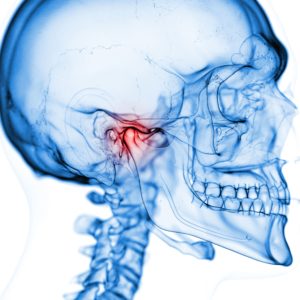
Have you noticed that your jaw is sore or stiff in the morning when you wake up or do you hear a clicking sound when you open your mouth? If so, you may have developed a temporomandibular joint disorder. These circular hinge joints allow a full range of motion when they’re functioning properly. However, it’s possible for your jaw to become irritated and inflame the tissues surrounding them. This can cause issues that contribute to more serious conditions, so it’s important to get help before it progresses.
If you’re concerned you may have developed a problem, read on to learn about 5 myths around this topic so that you can help yourself heal and recover.
Myth #1: TMJ is a Medical Issue
In truth, TMJ refers to the joints specifically. When you develop pain in your jaw and the surrounding muscles, it’s known as a TMJ disorder, or TMD. The correct term to use when speaking with your doctor or dentist about it is TMD.
Myth #2: TMD is Rare
Unfortunately, TMD isn’t as uncommon as you might assume. More than 10 million people in the United States alone are coping with its symptoms. An estimated 1 in 10 people around the world have developed a problem with their TMJ. Though it can impact people of all genders and ages, it tends to be more common in adult women between the ages of 20 to 40 years old.
Myth #3: TMD is Caused by Physical Injuries
In some cases, like whiplash from a car accident, this can be true. However, it has also been known to occur when there’s added pressure on the joint from other causes like:
- Bruxism. People with this condition frequently grind or clench their teeth, often subconsciously at night.
- Malocclusion. A bite misalignment like this one forces your muscles and jaw to overcompensate because your pearly whites don’t line up properly when you close your mouth.
Myth #4: My Other Symptoms are Unrelated
Jaw pain isn’t the only indicator of TMD. You could also experience symptoms like:
- Headaches.
- Earaches.
- Locked jaw that won’t open.
- Chipped or fractured teeth.
- Gum recession.
- Challenges falling and staying asleep.
- Malnutrition.
Myth #5: TMD Requires Surgery
While there are surgical options that can alleviate TMD, it’s probably not the first treatment your dentist will recommend. They might first provide oral appliances for you to use at night in combination with specific physical exercises or massage therapy, for example. Thankfully, it can often be cleared up without the need for invasive procedures.
Now that you know more about TMD, you and your dentist can work together to treat it properly!
About the Practice
At Rauchberg Dental Group, a team of dedicated dentists works together to provide a full range of oral care services to meet all your needs, including TMD treatments. With years of experience relieving patients’ jaw pain, and with multiple therapy types available, they’re sure to have ways to help alleviate your symptoms. If you think you may have an inflamed TMJ, you’re welcome to request an appointment on the website or by calling (973) 718-9887.
